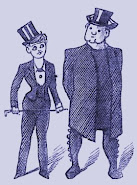 |
| [1] Preview of Bourlekrane, with camera bag and pencil on the road to Morocco, 18 June 1925, les petits bonshommes. |
This French comic strip character is from a forgotten children’s weekly with no capital letters in its title, les petits bonshommes (the little puppets), sub-titled ‘Paraissant tous les jeudis’ (appears every Thursday) in 1925. It was published in Paris by a company named Société Anonyme “Education”; perhaps it just set out to educate reading — judging by the paper’s title payoff ‘…quand même!…’ which translates to: ‘even them.’
Artist-writer Aristide Perré (1888-1958) made several strips for this magazine in the early 1920s. Mildly humorous stories in a seemingly primitive but effective bigfoot and silly walk style.
Strips such as the adventures of Bourlekrane, reporter of Le Petit Bobard, for which the first announcement appeared in print in les petits bonhommes of 18 June 1925. The French ‘bobard’ means little lie. The French ‘boule crane’ means ball skull, although that may have nothing to do with the name of the comic character.
 |
| [3] Bourlekrane chez les indigènes. |
A similar 1920s reporter featuring in comic strip adventures was Tintin, reporter of Le Petit Vingtième, created by Hergé (1907-83) on 4 January 1929. Belgian reporter Tintin (short for ‘Valentin’) started his career as primitive as his French colleague Bourlekrane. The strip appeared on Thursdays too, in Le Petit Vingtième, the weekly children’s supplement of a small Brussels newspaper, Le Vingtième Siècle (the twentieth century).
Update:
Jean-Claude Michel has provided a more exact meaning for the term ‘bourlekrane’. He explains
“In fact, “Bourlekrane” is just a name constructed about “bourre le crâne”, and this expression means something like “brainwashing”.
For instance, someone who tell (or write) false facts, but so well that many people finally believe what he says.
In other terms, the name “Bourlekrane” is very well adapted for a certain kind of journalists...”
Jean-Claude Michel has provided a more exact meaning for the term ‘bourlekrane’. He explains
“In fact, “Bourlekrane” is just a name constructed about “bourre le crâne”, and this expression means something like “brainwashing”.
For instance, someone who tell (or write) false facts, but so well that many people finally believe what he says.
In other terms, the name “Bourlekrane” is very well adapted for a certain kind of journalists...”














Bourlekrane would probably be read as
ReplyDelete'bourre-le-crâne'. ('bourrer le crâne' means
'stuff the head/skull', generally with doctrinary,
superfluous, nonsensical matter.)